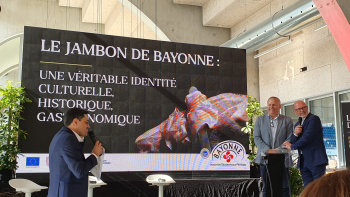This article is older and has been archived.
It remains accessible, but the information provided may be out of date or incorrect.
News
Bayonne Ham" PGI celebrates its 25th anniversary
INAO took part in the event organized by the Bayonne Ham PGI consortium, held in conjunction with the 560th Bayonne Ham Fair, on Friday April 7, 2023. The event marked the 25th anniversary of the "Jambon de Bayonne" protected geographical indication. An opportunity to showcase a product that is emblematic of France's food heritage.

Through strict, demanding specifications, the "Bayonne Ham" PGI has improved the quality of this product and created value that is fairly distributed among all players in the industry. More than 914,000 hams were produced in 2022. The PGI also makes a major contribution to local development, with the creation of 5,000 jobs in its production area.
A strong commitment to social and environmental responsibility
The Consortium du jambon de Bayonne and the operators involved in the sector are mobilized to protect the characteristics and typicality of a product born of ancestral know-how. The operators also take into account today's major challenges. The event was an opportunity to showcase the group's progress in its "Raison d'Être" approach to social and environmental responsibility (SER). This dynamic is helping to further unite players around shared projects that reinforce the economic, environmental and social sustainability of the industry.

Bayonne Ham PGI
Bayonne Ham is a pork leg salted with salt from the Adour Basin salt marshes and cured in this area for at least 7 months. The ham comes from pork butchers fed on cereals, and is prepared according to a specific traditional cut.
The production and slaughtering territory for Jambon de Bayonne pork butchers extends over 22 départements in south-western France, corresponding to ancient trade patterns that continue today. Processing, meanwhile, takes place in the Adour basin, an area that includes the Pyrénées-Atlantiques department and the neighboring cantons of Hautes-Pyrénées, Gers and Landes.
.